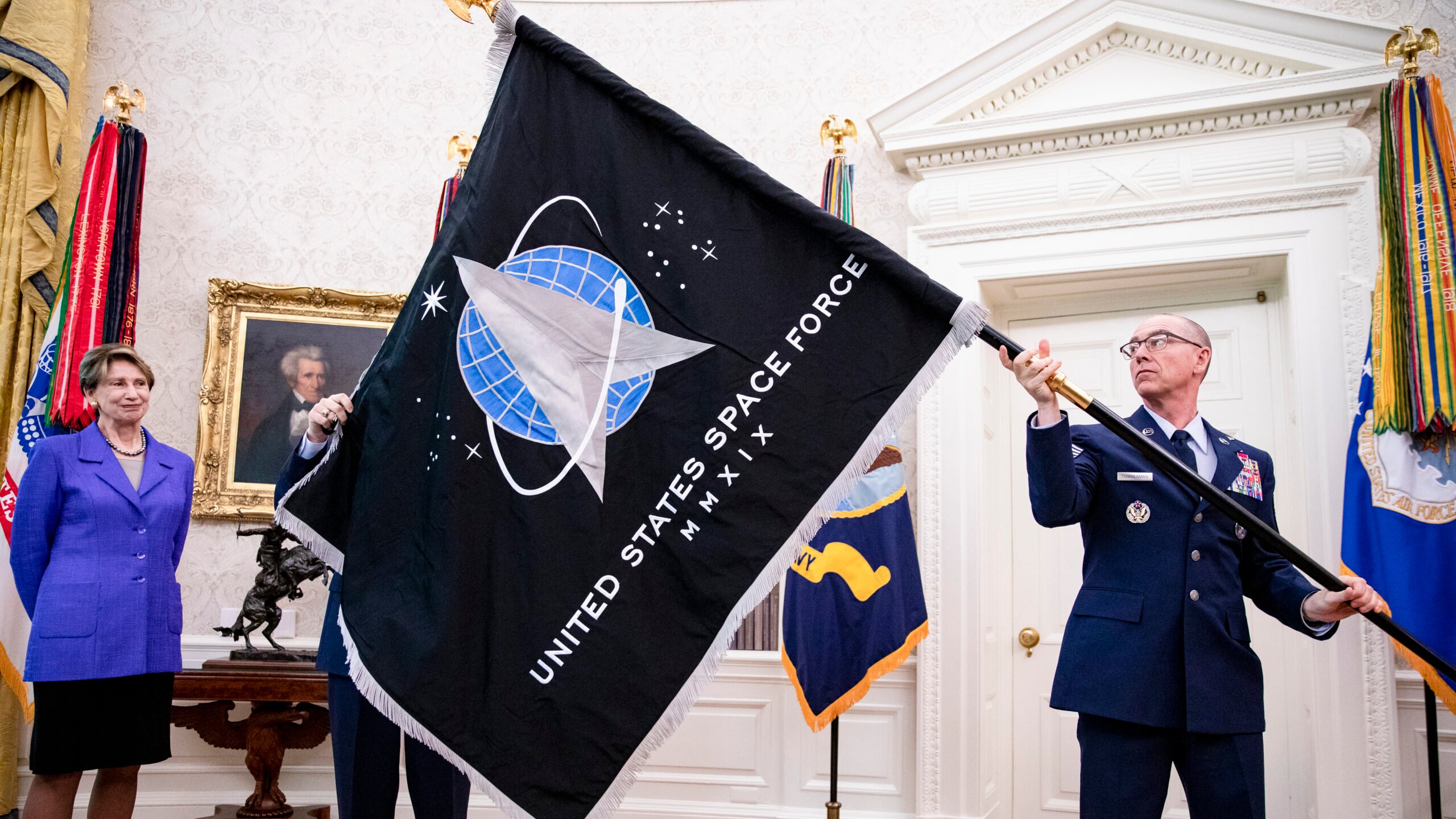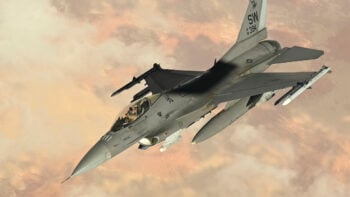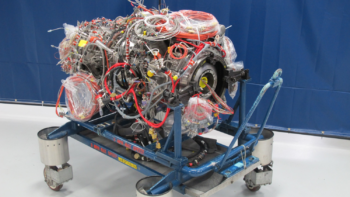
WASHINGTON, DC – MAY 15: Chief Master Sgt. Roger Towberman (R), Space Force and Command Senior Enlisted Leader and CMSgt Roger Towberman (L), with Secretary of the Air Force Barbara Barrett present US President Donald Trump with the official flag of the United States Space Force in the Oval Office of the White House in Washington, DC on May 15, 2020. (Photo by Samuel Corum-Pool/Getty Images)
With Congress deep in discussions about whether to create a National Guard arm of the Space Force, both supporters and detractors of the idea are throwing their hats in the ring. For Tim Ryan and Stuart Pettis, both of the Air and Space Forces Association, the answer is simple: Congress shouldn’t overthink it.
As described in the fiscal 2023 Department of the Air Force posture statement, “The Space Force must take urgent action to meet growing threats to vital national interests and to strengthen deterrence.” These actions included organizing all space operators and space operations under the Space Force, including space operations currently conducted by the Air National Guard.
These units not only provide a surge capacity for the active-duty force, but they also provide critical aspects of day-to-day space operations. In addition, Guardsmen bring a wealth of knowledge from their civilian positions, many in the space industry.
Therefore, it is critical that the Space Force establishes a Space National Guard. It’s the most obvious way to ensure the military does not lose this critical experience and capacity.
For years, space was treated as a benign environment that joint operations and the US way of life became dependent upon, from GPS to satellite communications. This was not lost on China and Russia, who are focused on overtly contesting US space capabilities, spanning the spectrum of warfare, to include kinetic strikes. The 2020 Chinese Science of Military Strategy sums this up: “Space has already become a new domain of modern military struggle; it is a critical factor for deciding military transformation; and it has an extremely important influence on the future form-states, modes and rules of war.”
Congress acted on this transformation by establishing a separate military branch to build a strong, integrated, robust set of operating capabilities on orbit, while guiding smart strategies and focused expertise. Lawmakers’ intent was to integrate and merge existing military space capabilities within the United States Space Force. This means maximizing all available tools — including the capabilities of the Air National Guard.
RELATED: Question of Space National Guard heats up following legislation, hearings
Since 1996 the Air National Guard has conducted space operations. This has been of great fiscal value through its part-time talent and the added skills and expertise Guardsmen bring. The Air National Guard provides a reserve of trained personnel for critical surge capabilities during wartime and is the only unit-equipped combat reserve component. The 1,000-plus Airmen assigned to 16 units across seven states and one territory provide 60 percent of the space electronic warfare, 50 percent of protected satellite communications and the only mobile, survivable missile warning capability supporting critical US Strategic Command plans. These are not Air Force missions; they are Space Force missions that continue to be misaligned under the Air National Guard.
The Air National Guard leadership continue to support their space personnel, but authorities and command relationships do not align. Think of it this way: no one would think aligning the Air Guard under the Navy is a promising idea. In 2020, Chief of the National Guard Bureau, Gen. Joseph Lengyel stated, “I believe that one of the things that is best about [the National Guard] is we mirror the culture of our parent service. So, there is only one standard to be a soldier in the Army. There is only one standard to be an airman in the Air Force. There will be a standard to be a space warrior in the Space Force and I believe that it is important that the space capability currently in the National Guard should move into the Space Force.”
The reality is Space Force leadership need to align these missions today, to avoid problems in time of conflict that are doomed to create critical failures resulting in later investigations revealing this obvious truth.
The administration understands this and has proposed a full-time/part-time single component plan. However, this is an unproven construct at a time when organizational experimentation is ill-advised. We are at a time when resources are exceedingly tight, mission demand is soaring and the need for a deep bench of seasoned talent is more important than ever. We cannot lose the space capabilities the Air National Guard provides today. The threats have made space more contested than ever; we must have the experience and unit-equipped capabilities of the Air National Guard to reinvent the space enterprise.
The House has put forth an amendment in its 2023 National Defense Authorization Act to establish the Space National Guard. This is a positive step forward to correct the misalignment and ensure space operators in the Air National Guard have the same training opportunities to maintain readiness and the ability to establish a Space Force culture, like any other Guardian.
Some have made the argument “why does a state need space capabilities in its Guard?” It is not about the need for a governor to have space capabilities, it is about keeping the experience, talent, and capabilities that Guardsmen provide. It is the exact reason we have fighters and bombers today in the Air National Guard, no one asks “why does a state need fighters or bombers?”
Congress and the administration are faced with one of two solutions: establish a Space National Guard, or lose the manpower and experience that exists in the Air National Guard. Resources are tight, threats are real and increasing, we need the best talent America has for our defense. We should not waste time by inventing a new system; we need to get on with the mission. Congress has the right solution, and the administration should embrace it, establish a Space National Guard now.
Tim Ryan is a Senior Resident Fellow for Space Studies at the Air and Space Forces Association’s Mitchell Institute. Stuart Pettis is AFA’s Director of STEM Education Programs.





















